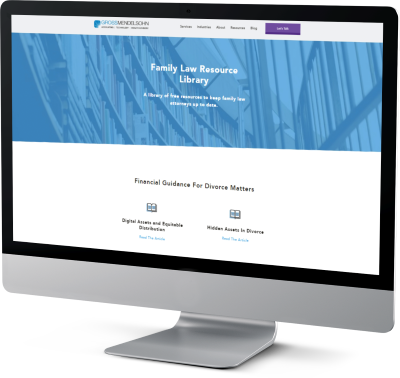The Tax Cut and Jobs Act (TCJA) of 2017 impacted all U.S. taxpayers due to drastic changes in the tax code. Some of these changes were permanent, while others expire (or “sunset”) after December 31, 2025. This means that unless Congress acts, several provisions will revert to the way they were pre-TCJA as of January 1, 2026.
Since it is impossible to predict what Congress will do before the end of 2025, there is a lot of uncertainty and potential for widespread changes. With this in mind, we strongly suggest that family law attorneys consider how clients may be impacted when negotiating and crafting divorce agreements.
In this article, we'll break down the expiring and permanent provisions, how sunsetting changes will look when the TCJA expires and key considerations you should consider when handling your cases.
Permanent Versus Sunsetting Provisions
Before diving into the impacts of various sunsetting provisions, let’s separate fact from fiction and determine which TCJA changes are permanent, and which are sunsetting.
| TCJA Changes* | Permanent | Sunsetting |
| Alimony is neither deductible nor taxable | X | |
| Allow annual 529 distributions of $10,000 for elementary and secondary tuition | X | |
| Individual tax rates lowered | X | |
| Standard deduction increased* | X | |
| Changes to itemized deductions: | ||
| — Suspension of 2% miscellaneous itemized deductions | X | |
| — State and local tax (SALT) deduction limited to $10,000 | X | |
| — Deduction for interest limited to first $750,000 of mortgage principal | X | |
| — Suspension of interest deduction for home equity loans*** | X | |
| — Suspension of limitation on itemized deductions | X | |
| Increased Child Tax Credit (CTC) to $2,000 per child and increased phaseout*** | X | |
| $500 credit for other dependents | X | |
| Suspension of exemption | X | |
| Qualified business income (QBI) deduction | X | |
| Corporate tax rate lowered to 21% | X | |
Notes:
*This list is not all-inclusive of the TCJA changes. The items listed above are considered the most relevant to divorce matters.
**Suspension of deduction for interest expenses on home equity loans, unless used directly for expanding, improving or the building of a new home.
***See tables later in the article for details.
Possible Impacts of Sunsetting Provisions
Now that we know which provisions are set to expire, let’s take a deeper look at the specific changes, what the provisions currently entail and what they’ll potentially look like come January 1, 2026.
Individual Tax Rates
Individual tax rates will revert to pre-TCJA levels, which will increase the marginal tax rate for most taxpayers. The marginal tax represents the amount of additional tax paid for every additional dollar of earned income.
| Tax Rates | |
| 2018-2025 | Estimated Post-TCJA Expiration (2026) |
| 10% | 10% |
| 12% | 15% |
| 22% | 25% |
| 24% | 28% |
| 32% | 33% |
| 35% | 35% |
| 37% | 39.6% |
Note:
Tax brackets will be based on filing status and adjusted for inflation.
Standard Deductions
The standard deduction will revert to pre-TCJA levels, after being adjusted for inflation. While the TCJA has been in effect, many taxpayers have found it more beneficial to take the standard deduction rather than itemizing. If this portion of the TCJA expires, some taxpayers may find themselves with a larger tax bill if they are unable to take advantage of itemized deductions.
| Standard Deduction By Filing Status | 2018-2025 | Estimated Post-TCJA Expiration (2026)* |
| Married Filing Joint (MFJ) | $24,000 - $29,000 | Approximately $17,000 |
| Head of Household (HOH) | $18,000 - $21,900 | Approximately $12,000 |
| Single | $12,000 - $14,600 | Approximately $8,000 |
Note:
*The standard deductions post-TCJA were estimated using the Chained Consumer Price Index for All Urban Consumers (C-CPI-U): U.S. city average, published by the Bureau of Labor and Statistics.
Itemized Deductions
The TCJA capped or suspended many itemized deductions, including:
- State and local taxes: The deduction for state and local taxes paid is currently capped at $10,000. Once expired, all state and local taxes paid will be deductible again. State and local taxes include real estate taxes, state or local income taxes, and personal property taxes.
- Mortgage interest deduction: The mortgage interest deduction is currently limited to interest paid on up to $750,000 of mortgage principal first and second homes. Once the limitation expires, mortgage interest will be deductible again for up to $1,000,000 of the mortgage principal.
- Home equity loan interest: The TCJA disallowed the deduction for interest paid on up to $100,000 of home equity loans unless the loan principal was specifically used to buy, build or substantially improve the residence. Once expired, home equity loan interest will be deductible again regardless of the loan purpose.
- Miscellaneous itemized deductions: All miscellaneous itemized deductions, which were subject to the 2% of adjusted gross income (AGI) floor, were suspended under the TCJA. Once expired, taxpayers will be able to deduct these items again. Miscellaneous itemized deductions include investment/advisory fees, legal fees and unreimbursed business expenses.
All miscellaneous itemized deductions, which were subject to the 2% of AGI floor, were suspended under the TCJA. Once expired, taxpayers will be able to deduct these items again. Miscellaneous itemized deductions include investment/advisory fees, legal fees and unreimbursed business expenses.
| Deductions | 2018-2025 | Estimated Post-TCJA Expiration (2026) |
| State and local tax deduction | $10,000 | No limits |
| Mortgage principal limited for interest deduction | $750,000 | $1,000,000 |
| Interest on $100,000 of home equity loans | Limited to interest used to buy, build or improve residence | Deductible regardless of purpose |
| Miscellaneous (2% of AGI) deductions | Non-deductible | Deductible |
Note: If itemized deductions revert to pre-TCJA rules, the limitations on itemized deductions may be reinstated. The pre-TCJA rules reduced deductions by the lesser of:
- 3% of income above certain thresholds
- 80% of the amount of otherwise allowable itemized deductions
Child Tax Credit and Other Dependent Credit
The Child Tax Credit (CTC) was increased to $2,000 as part of the TCJA. The expanded CTC is expected to expire and will revert to $1,000. The entire CTC will be refundable again for those who fall below the income phaseout thresholds. The credit for other dependents of $500 will go away. Before the TCJA, there was no such credit for other dependents.
The TCJA more than doubled the income phaseout levels for the CTC. If allowed to expire, the income phaseout thresholds will return to pre-TCJA levels, adjusted for inflation and will be approximately half of the current phaseout levels.
Exemptions
Taxpayers were able to claim personal, spousal and dependent exemptions prior to the enactment of the TCJA. If this sunsets, exemptions will return in 2026. Exemptions are a subtraction from AGI to arrive at taxable income.
Reinstated exemptions will be approximately $5,000 (adjusted for inflation) for each exemption claimed. For taxpayers who will not itemize, exemptions will make up for some of the shortfall from the lowered standard deduction.
Exemptions are also subject to phaseout for high income taxpayers, starting at approximately $325,000 for single taxpayers.
Qualified Business Income Deduction
The qualified business income (QBI) deduction was introduced with the passage of the TCJA and allows for a 20% above-the-line deduction for sole proprietors and owners of pass-through entities, subject to income limits. If allowed to expire, small business owners may see a substantial increase in their tax burden. C corporations, however, will still benefit from the permanently lowered corporate tax rate of 21%.
Key Divorce Case Considerations
When negotiating divorce settlements, it is important to understand how the sunsetting TCJA provisions may change the tax landscape after 2025. We believe the key considerations for family law attorneys are:
- Increased taxes: Between the increase to the marginal tax rates and the loss of the QBI deduction, there may be less cash available for support purposes.
- Expanded itemized deductions and lowered standard deduction: Home expenses, such as mortgage interest and real estate taxes, will become more valuable.
- Claiming dependents: The custodial parent will benefit from the reinstatement of exemptions even with the CTC cut in half (exemptions and the CTC are transferrable to the non-custodial parent).
The sunsetting TCJA provisions may change the tax code in numerous ways. With so many potential changes on the horizon, it is crucial to keep these items in mind when helping clients negotiate their divorce agreements.
Need Help?
Our Forensic, Valuation & Litigation Support Group can help. Contact us here or call 800.899.4623.


